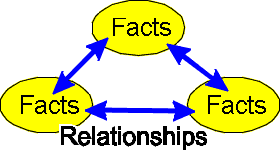Developing constructs

What does the word "construct mean"? The Oxford dictionary
defines it as:
- An object of perception or thought, formed by a
combination of present with past sense-impressions.
- Anything constructed, esp. by the mind; hence spec., a
concept specially devised to be part of a theory.
As a scientist you need to develop constructs, in your mind, for how you think things
work.
Imagine learning Lego construction through lectures. Lectures are not a good way of
acquiring this skill. Much of your undergraduate training was through lecturers. Now you
have been given your own Lego construction set and you have to learn how to build
something.
This requires reading less and thinking more.
What is a construct in science?

A construct is any useful representation of the inter-relationships between
facts.
- To help develop these internal constructs, scientists often build real
ones.
- These can take on a variety of forms.
- Crick & Watson developed a physical working model
of the structure of DNA.
- Others use mathematical models and simulate
them on computers.
Why you need constructs in graduate school?

1. To keep from reading too much.
- Graduate students often read too much and too fast,
assembling long lists of often contradictory and useless facts.
- A construct helps you to focus
on what is relevant.
- It is also useful because it forces you to slow down. It takes time
to stop, reflect, build up a construct, and see how these facts fit and
interrelate (or not).
- A construct helps you discover what you don't know.
This is essential in deciding what you need to read/study next.
2. To keep from doing too many experiments.
- A construct's key feature is that it allows one to make
predictions (hypothesis) which can be tested experimentally.
- With a construct, you can ask whether each new observation
fits. If not, is the new observation false or is your construct incorrect?
A student was working on a project to determine whether a certain brain
area had a retinotopic representation. For months the student was pleased
with the results of the experiments. However a week before his presentation
date the student realized that he had not fully understood the relationships
implied by the word "retinotopic". In fact none of the data showed
a retinotopic relationship. Well constructed hypotheses can help you avoid
similar mishaps.
- You need a construct to determine which experimental
observations are relevant. In science one is often drowned in
data. The key is to know which data to focus on.
- Be prepared to discard even the most cherished construct. Consider any
one particular construct as cheap and dispensable.
With time, this process allows you to develop confidence
in yourself and your own ideas.

Copyright © 1995
Tutis Vilis
Department of Physiology and Pharmacology
University of Western Ontario
London Ontario Canada |
Created 28 Sept 1995
Last updated
10 January 2007
 Comments
welcome: tutis.vilis@schulich.uwo.ca Comments
welcome: tutis.vilis@schulich.uwo.ca |
![]()